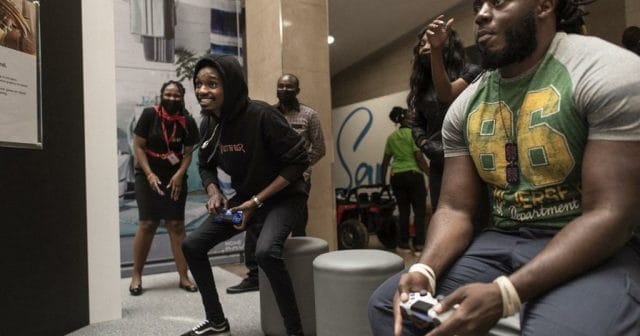
Brian Diang’a never imagined that his childhood passion could become a career: this gamer found refuge in video games and e-sports to escape a difficult family life in Africa’s largest slum in Nairobi.
“Gaming was my only escape,” the 28-year-old told AFP, recounting his childhood.
The man who is now known as “Beast” discovered video games at the age of nine.
“My father became an alcoholic, he would come home drunk and beat my mother. My house became a place where I didn’t want to be,” he says.
He then went to gambling halls on a daily basis, much to the dismay of his mother, who feared this would have a bad influence on him and distract him from his schoolwork.
“My mother used to beat me up every time she found me in playrooms,” he recalls.
However, far from plunging into the abyss of drugs and crime, he turned to tournaments, which opened the door to lucrative partnerships.
Today, he earns about 50,000 Kenyan shillings a month (400 euros) in a country where youth unemployment remains a huge problem.
– Atypical career –
It all started for him in 2013. “I came across YouTube videos where I saw players abroad playing Mortal Kombat – a game I frequently played to pass the time – and being paid up to $5,000 to compete,” he explains.
He decided to do the same. Like other Kenyan gamers, he is now trying to make a place for himself in the booming esport industry.
Such a life choice seems far-fetched in Kenya, where academic achievement and athletic ability are considered the only path to success.
While studying law, Sylvia Gathoni became an e-sport pioneer.
In 2018, the young woman, who plays the fighting game Tekken under the name “Queen Arrow”, became the first female player from Kenya – both male and female – to be recruited by an international team, UYU, based in the US.
“The older generation has been trained to think that in order to succeed, you have to follow a specific path: go to school, work hard at your studies and then pursue a career,” she says.
She now travels around the world to compete in international tournaments alongside big names.
– No structure –
However, the gaming sector still faces major obstacles in Africa, a continent that could be a growth market with 60% of its population under 25.
Many gamers face slow internet speeds and time differences with their foreign counterparts in developed countries, where the vast majority of servers are located.
In Kenya, gamers and gambling dens are also under close police scrutiny, as the law does not distinguish between e-sports and gambling.
“During my research, I discovered that the law has to keep up with technology. There is still a lot of backlog,” says Gathoni, who wants to specialise in e-sports law to bring about change.
No official framework exists in Kenya, where gamers compete in informal tournaments with cash prizes.
“There is no structure at the moment, it’s just a group of friends who get together to play,” says tournament organiser Ronny Lusigi.
“For video games to become e-sports, you have to be organised and competitive,” he says.
Brian Diang’a, who now mentors young gamers in Kibera and organises tournaments across Kenya, hopes to see video games “explode in Africa”.
“Gaming kept me sane when everything was falling apart,” he says. “I want to see more people get into this culture.

